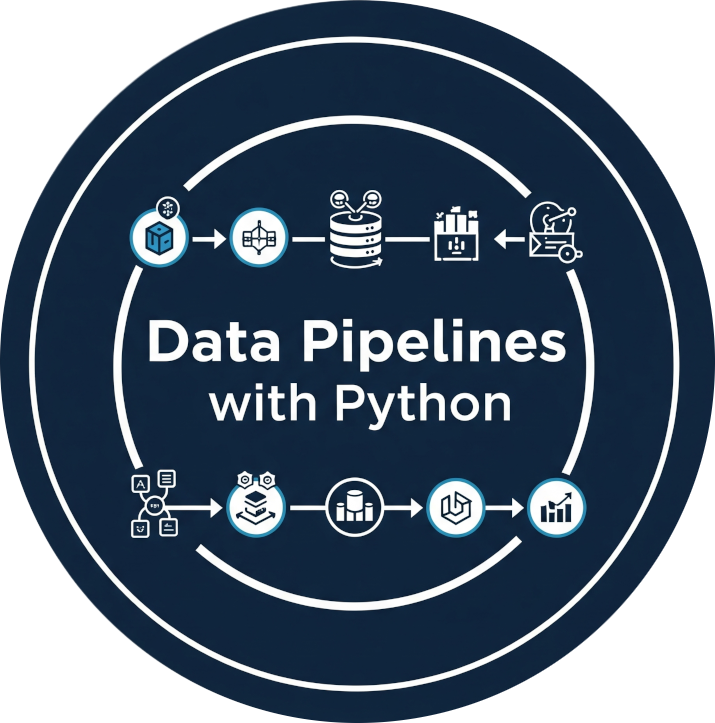PY-201

| Formats: | Asynchronous |
| Blended | |
| Online | |
| Onsite | |
| Part-time | |
| Level: | Intermediate |
| Prerequisites: | |
| Recommended Knowledge | |
Formats: We offer our training content in a flexible format to suit your needs. Contact Us if you wish to know if we can accommodate your unique requirements.
Level: We are happy to customize course content to suit your skill level and learning goals. Contact us for a customized learning path.
Data Pipelines with Python (PY-201)
Mastering Python for Robust ETL/ELT Processes and Data Orchestration in South Africa
In today's data-intensive world, raw data is rarely ready for immediate analysis. It needs to be collected, cleaned, transformed, and loaded into analytical systems. This critical process is handled by data pipelines, and Python has emerged as the go-to language for building them, offering unparalleled flexibility, a rich ecosystem of libraries, and broad community support.
At Big Data Labs, located in Randburg, Gauteng, we understand that efficient data movement is the backbone of any successful data strategy. This Data Pipelines with Python course is designed to equip data professionals with the essential skills to design, build, and deploy robust, scalable, and maintainable data pipelines using Python, transforming disparate data into actionable insights for businesses across South Africa.
Target Audience
This course is ideal for professionals looking to enhance their data engineering capabilities or transition into data pipeline development:
Data Engineers & Aspiring Data Engineers
Building and maintaining ETL/ELT processes and data infrastructure.
Data Analysts & BI Developers
Who need to understand and contribute to the underlying data preparation processes.
Software Developers
Transitioning into data-focused roles or building data-intensive applications.
Data Science Professionals
Who need to prepare and transform data for machine learning models.
Prerequisite Skills
To benefit fully from this course, participants should have:
- Solid Python Programming Fundamentals: Understanding of variables, data types, control flow, functions, and basic object-oriented concepts.
- Basic SQL Knowledge: Ability to write basic SELECT queries.
- Familiarity with Command Line Tools: Comfort with navigating and executing commands in a terminal environment.
What One Will Learn (Learning Outcomes)
Upon completion of this course, you will be able to:
- Design Data Pipelines: Understand the stages, types, and best practices for robust pipeline architecture.
- Extract Data with Python: Connect to and extract data from various sources (databases, APIs, files).
- Transform Data with Pandas & NumPy: Clean, transform, and aggregate data efficiently using key Python libraries.
- Load Data to Destinations: Implement strategies for loading processed data into databases, data warehouses, or storage.
- Orchestrate Workflows with Airflow: Schedule, monitor, and manage complex data pipelines using Apache Airflow.
- Implement Best Practices: Incorporate logging, error handling, testing, and modularity for production-grade pipelines.
Target Market
This course is relevant for organisations in South Africa across all industries that collect, store, and analyse data to drive business value:
Enterprises & Corporations
Building centralized data platforms for reporting and analytics.
Tech & Software Companies
Developing scalable data infrastructure for their products and services.
Financial Services & Banking
Managing transactional data, risk analytics, and regulatory reporting.
Healthcare & Pharma
Processing patient data, research findings, and operational metrics.
Organisations Using Cloud Data Platforms
Building data pipelines integrated with cloud storage and compute services.
Course Outline: Data Pipelines with Python
This course provides a hands-on approach to building, managing, and optimising data pipelines using Python and industry-standard tools.
Module 1: Introduction to Data Pipelines & Python Fundamentals for Data
- What are Data Pipelines? Importance, types (batch, streaming), and lifecycle.
- Python's indispensable role in data engineering and its ecosystem.
- Refresher on Python basics for data: data structures, functions, basic OOP.
- Setting up development environments: Virtual environments (
venv,conda) and package management (pip).
Module 2: Data Extraction (E) with Python
- Connecting to Relational Databases: Using
psycopg2,SQLAlchemy, etc., for SQL data. - Interacting with APIs: Making HTTP requests using the
requestslibrary. - Working with Files: Reading and parsing CSV, JSON, XML, and other file formats (
pandas,csv,json). - Strategies for Incremental Data Extraction and change data capture (CDC) concepts.
Module 3: Data Transformation (T) with Pandas & NumPy
- Introduction to
pandas: DataFrames, Series, and core operations for data manipulation. - Data Cleaning Techniques: Handling missing data, duplicates, outliers, and inconsistent values.
- Data Aggregation and Grouping: Summarizing data for analytical purposes.
- Data Type Conversions and Schema Enforcement in Python.
- Data Validation: Ensuring data quality and integrity.
- Introduction to
NumPyfor efficient numerical operations.
Module 4: Data Loading (L) to Various Destinations
- Loading Data to Relational Databases: Efficient bulk loading techniques.
- Loading Data to Data Warehouses: Best practices for systems like PostgreSQL, ClickHouse, or cloud data warehouses (e.g., loading to S3/Azure Blob first).
- Writing Data to Cloud Storage: Interacting with S3, Azure Blob Storage, Google Cloud Storage.
- Batch Loading vs. Incremental Updates: Strategies for efficient data synchronisation.
Module 5: Orchestration and Scheduling with Apache Airflow
- Introduction to Workflow Orchestration: Why it's crucial for data pipelines.
- Scheduling Basics: Cron jobs and their limitations.
- Introduction to Apache Airflow: Concepts, components, and advantages.
- Building Your First DAG (Directed Acyclic Graph): Tasks, operators, and sensors.
- Managing Connections and Variables in Airflow.
- Monitoring and Alerting for Airflow Pipelines.
Module 6: Advanced Topics & Best Practices for Production Pipelines
- Containerisation for Pipelines: Introduction to
Dockerfor consistent environments. - Data Pipeline Testing Strategies: Unit, integration, and data validation tests.
- Handling Large Datasets: Introduction to generators, Dask, and high-level concepts of PySpark.
- Robust Error Handling, Retry Mechanisms, and Idempotency in pipelines.
- Logging and Monitoring: Best practices for visibility into pipeline health.
- Introduction to Real-time Processing Concepts: Brief overview of Python with Kafka/Pulsar.
- Deployment Considerations and Best Practices for Production-Grade Data Pipelines.